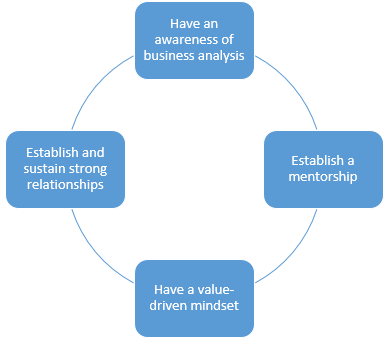4 Recommendations When Starting Your Career as a Business Analysis Professional
Five years ago, I began my BA journey as an intern. My interest was in the field of information systems, even though I graduated with a degree in Business Administration.
I remember updating the “objective” section on my resume to clearly indicate what job experience I was looking for. I stated I wanted experience as an accountant or business analyst. Accounting was very familiar to me because I took many accounting courses as part of the Business Administration undergraduate program. On the other hand, business analysis was quite unfamiliar, as there were no courses offered on this subject area. In fact, the only reason why I put it in the objective statement was because I read online that a business analyst position is an entry level position within Information Systems. I went to the internship interview, not truly knowing what a BA was and, of course, was asked during the interview what I thought a business analyst was. This question caught me a bit off guard and I could only answer based on the very limited knowledge I had – “It’s a person who analyzes the business.” Luckily, the interviewers asked no further questions about business analysis. Fortunately, I was selected and placed in the IS Department as a business analyst intern.
 Recommendation #1
Recommendation #1
Do not go blindly into an interview for a business analyst position. At a minimum, have an awareness of what business analysis is and what business analysts offer to an organization. If you have the basics of business analysis understood, you will not be taken off guard by such a simple question as I was.
During the internship, I was fortunate enough to have multiple co-workers guide me through my work and mentor me. In some cases, I was assigned supporting tasks which I had very little understanding about the value it brought or what was trying to be accomplished in the big picture. I just took what I was given, did what I was told, and reported back to my mentors when I was done. Looking back, I wish I would have been more inquisitive. Doing the work was one thing, but understanding the why or the value behind it is another. While my mentors did their best to explain the “why” or the value of what I was doing, I just nodded my head in pretend understanding in many cases.
Recommendation #2
Be inquisitive, ask questions, and understand the value behind the work being delivered instead of having a task-driven mindset. Think strategy and value as often as you can. This will only enhance your business analysis acumen and expedite your learning.
As alluded to earlier, mentors were critical to my success as a business analyst. Any time I had difficulty with a task or needed guidance on how to approach something, I reached out to a mentor. Furthermore, as meetings and other collaboration came up, my mentors would include as an observer or scribe. I was able to take notes on these sessions and learn from what I was witnessing. As time progressed, my mentors moved me from supporting tasks to independent tasks. They provided guidance along the way and were always open to fielding questions or concerns.
Recommendation #3
Get a mentor. Some organizations have well established mentoring programs, while others mentor informally. Whichever type of organization you end up at, just make sure there is at least one go-to individual willing to help you out, provide guidance, and just be there for you.
After the completion of my internship, I was hired as a full-time Associate Business Analyst. By this time, I felt very comfortable with the organization’s BA practice. While I still had a lot of learning to do, I could satisfactorily complete BA tasks on my own. The first project I was assigned to was a great one. The organization followed Scrum, so naturally I was placed on a Scrum Team to assist with business analysis work. Specifically, this initiative was business rule heavy, with light process modeling and prototyping. One thing that allowed me to grow as a BA was the established stakeholder engagement process. For each business rule written, each process modeled, or any other business analysis artifact, one or more subject matter experts (SMEs) would have to be consulted. From there, I would elicit the information, capture it in the appropriate artifacts, and return to the SMEs. The SMEs would then review the output, suggest changes if any were needed, and finally approve it. This process allowed me to work with people from across the organization and learn about various business areas. More importantly, it enabled me to establish relationships. Relationships cannot be understated in the world of the BA. You can have a relationship with a stakeholder, but it needs to be a positive and strong relationship.
Recommendation #4
Establish and build strong stakeholder relationships by continually producing high-quality outputs and coming forward with solutions that meet stakeholder needs (thus delivering value). Having great relationships with stakeholders makes communication, collaboration, teamwork, problem solving, and decision making easier. Simply put, it makes your life as a BA easier!
